Search Images
Browse Content (p. 915)
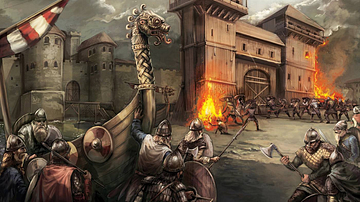
Image
Siege of Paris, 885-886 CE
A depiction of the Siege of Paris in 885-886 CE, by Mirco Paganessi.
Courtesy of Medieval Warfare Magazine / Karwansaray Publishers.

Image
Recreation of the Etemenanki in Babylon
The Etemenanki (Sumerian for: "temple of the foundation of heaven and earth") was a massive ziggurat dedicated to Marduk in ancient Babylon. It is unclear when the Etemenanki was originally constructed, and it is sometimes associated with...

Image
Recreation of the Cult Centre at Mycenae
A modern recreation of the palatial cult centre at Mycenae during the Greek Bronze Age, by Rocío Espin.
Courtesy of Ancient History Magazine / Karwansaray Publishers.

Image
Athenian Agora and Acropolis
Artist's impression of a view across the Agora on an early summer evening, looking southeast towards the Acropolis. Trees and plants had been planted in the Agora from the time of Cimon in the mid fifth century BC. Left of centre is the Altar...

Image
Fresco in the Fourth Pompeian Style
Wall decoration in the Fourth Pompeian Style consisting of black central panels with architectural motifs. House of the Black Hall in Herculaneum. 1st century CE.
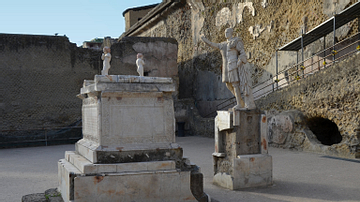
Image
Terrace of Marcus Nonius Balbus in Herculaneum
The Terrace of Marcus Nonius Balbus lies in the suburban dIstrict of Herculaneum, near the ancient waterfront. Dominating the terrace are a statue of M. Nonius Balbus, together with a memorial altar set up in his honour. Balbus was a native...
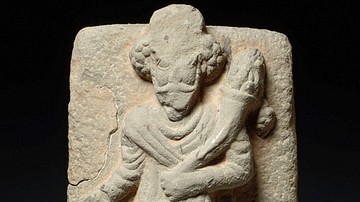
Image
Parthian King Offering Sacrifice
This is the frontal bas-relief of a Parthian king offering sacrifice to the god Heracles-Verethragna, patron god of royal dynasties, presently housed in room 310 of the Louvre Museum, Paris, France. 2nd-3rd century CE.
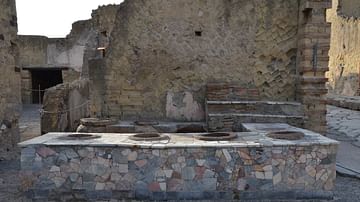
Image
A Thermopolium in Herculaneum
The remains of a thermopolium (cook-shop) that sold food and drink in Herculaneum. Eight earthenware jars that would have contained cereals, vegetables and ready-to-eat food are set in the counter.
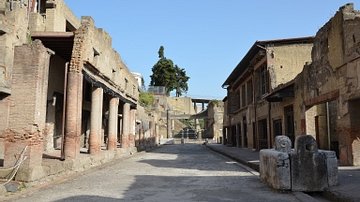
Image
Two-storey Buildings in Herculaneum
View of the Decumanus Maximus (main east-west axis) of Herculaneum with the House of the Black Hall on the left and the House of the Bicentenary on the right.
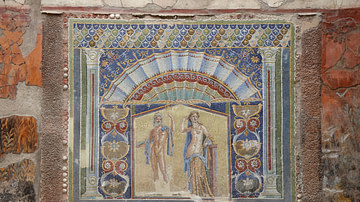
Image
Neptune & Amphitrite Mosaic, Herculaneum
Mosaic decoration depicting the sea god Neptune with his wife Amphitrite. Summer triclinium of the House of Neptune and Amphitrite, Herculaneum.